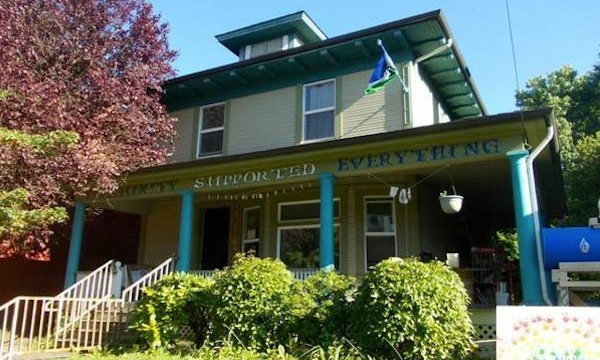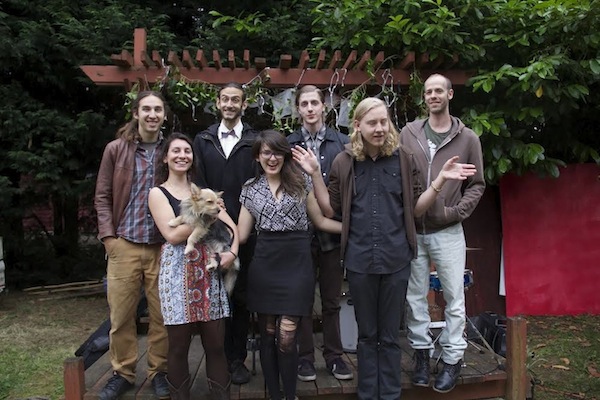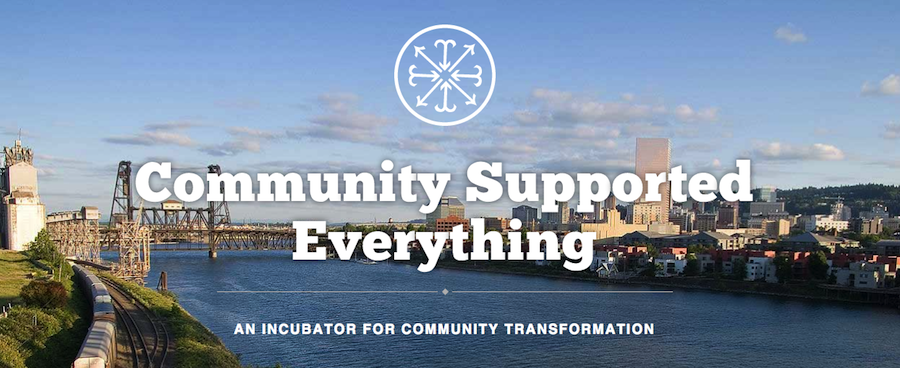When people are faced with a dire community challenge, they often turn to their neighbors to create a solution. There’s something powerful about starting where you are, with what you have, with the support of those around you.
Community Supported Everything is one such project, but with a kicker. It's a local solution designed to support other local solutions. Emerging out of the Occupy movement in Portland, Oregon, it’s an incubator for local changemakers. With a vision to transform higher education, Community Supported Everything provides a mentor-supported “high integrity, high accountability environment” to self-directed, creative changemakers doing solutions-based work.
Shareable connected with Sam Smith and Laura Scher, directors of the project, to discuss the importance of giving ideas a place to grow, how our education system has made us passive observers rather than proactive doers, and how being held accountable to your vision is incredibly empowering. Their responses are collaborative.
Shareable: Community Supported Everything is described as an incubator for community transformation. What does that mean on a personal level and on a community level?
Sam Smith and Laura Scher: Community Supported Everything is a place for prototyping small-scale solutions to large-scale challenges. Our approach is to tackle the hard, global problems—like food security, energy consumption, education reform—from the community level up, rather than the global or national level down. One-size-fits-all, top-down solutions are often ineffective at best and oppressive at worst. But when someone starts looking around their own community and asking, "what's working?," "what's not?," "how can we do this better?," they can usually come up with a better way of doing things. And if we do hit on something that works better for our community, chances are it will help other communities too.
The Community Supported Agriculture model is a perfect example of this. The model started with one farm in Switzerland in the 1980s, when a few farmers decided to try out a new model that seemed more logical to them than the dominant food system. Now, 30 years later, that model is spreading rapidly from farm to farm, being adapted and improved, and the collective social, environment, and economic impact is huge.
Community transformation begins with that attitude. People need to trust themselves to be able to make a difference—to be able to transform the world with their work. It means not accepting what we are currently doing as the best we could be doing. It means not waiting for someone else to fix our problems. It means having the audacity to imagine that things could be different. And not just different, but better. And not just better, but radically better.
The dominant model of education teaches us from a young age to be passive observers, to retain and recite knowledge we receive. We do not have a system of education that trains us to grapple with real-life challenges and take responsibility for creating solutions that don’t exist yet. The basic systems and institutions we rely on are beginning to break down. If we continue to do things the way we’ve always done them, we’re going to be in big trouble.
This is why we call Community Supported Everything an incubator. We give ideas a place to grow, and we’re trying to build a culture that integrates that “can-do” mindset. This includes visioning, strategic planning, coaching, troubleshooting, pushing past edges and seeing an idea through to actualization.

Community Supported Everything Headquarters
How did Community Supported Everything come about?
Community Supported Everything emerged after Occupy and has been evolving since. The original founders met each other at the Occupy Portland Library, a place of shared learning and resources. After Occupy Portland was pushed out of the park, we began organizing events and people who shared our vision for a thriving, healthy and equal world began to gather. The energy was really high. We found a space on Alberta Street and started running it as a community center to work with these ideas. We dove right in without really knowing where we were heading, but we learned from the challenges one by one.
The first year we faced significant challenges in terms of self-governance, accountability and scope of our work, and we nearly fell apart. We picked up the pieces and re-organized with more focus and clarity, which eventually brought us to the Communiversity model which is represented on our website. After finishing our pilot year we have a much better sense of what works and what does not work. Moving forward, our aim is to combine the integrity and focus of the education program with the larger community and our collective needs.
Throughout all of this transition, the core of our mission has remained steady. We know we can do better as individuals, as communities and as a global culture. We know we are creative and intelligent enough to change things. We’re tired of the escalating troubles in our world, and we are dedicated to positive and radical transformation, starting with where we live.
The project is rooted in hands-on education: pursuing passions, contributing to the culture, working and creating with integrity, and being accountable for actions. This is a big vision, but one that is being approached one person, one project, at a time. What is at the heart of Community Supported Everything? What is the big picture?
Consider the model of Community Supported Agriculture (CSA). CSAs are changing how we get our food, by encouraging people to build direct relationships with the farmers who grow it. Why can't we do that with our Internet? Our water? Our energy? Our education? Our Everything? Why can't we create small-scale, decentralized, community driven systems that meet community needs without giving our money to giant corporations? The truth is, there's no reason why we can't, but there are very real reasons why we don't. Creating new systems is a lot of work. It's hard. There are no right answers. There are always a million setbacks. It can be very discouraging work. But if you approach this work with a mindset of learning, everything changes. If you can trust that change is possible, then failure becomes synonymous with learning. Failure becomes a good thing. It means you’re really trying.
The heart of Community Supported Everything is the understanding that it’s up to us to make real change in the world, starting with where we live, what we know, and what we have. It's about stepping into the creator role and having the audacity to believe that we can create something that is better than what currently exists. It’s a terrifying thing! There are tremendous psychological, emotional, and social barriers that keep us from taking on the creator role. We’ve found that often the greatest barrier to taking action is our own belief system—our perceived limitations and fears. Having a supportive community of friends, mentors and coaches creates an environment that cultivates bold action. It gives people the freedom to fail safely. You learn to walk by falling down. You learn to speak by sounding out the hard words. If you’re not falling down, you’re not trying hard enough.

The Community Supported Everything volunteer web team (Shane Stranahan, Michael Dougherty, and Cameron Gaut) hard at work.
Through Community Supported Everything, people are working to create resilient communities. What would these resilient communities look like?
A resilient community is a community that can adapt to changing environmental, social, and economic conditions. It’s more of a mindset than it is a vision. It’s a community that can organize itself and tackle any challenge that comes.
The current reality is that our communities are heavily dependent on outside systems for things like food, energy, water, Internet, entertainment, education, etc. Truly resilient communities would be able to meet these needs from within the community. For us, that means small scale, open-source, decentralized systems that guarantee people can provide for themselves and their neighbors.
Here are a few examples of things we’d like to see:
- Decentralized Community Meshnet Internet: This could provides secure, encrypted Internet access to entire neighborhoods. Meshnet Internet can free us from reliance on large communication corporations. If implemented strategically, we could generate a surplus from membership which could be reinvested in the community. This also guarantees that access to information stays in the hands of the people, and mitigates the threat of the Internet being controlled for political gain.
- Small Scale Community Recycling / Trash Hauling Program: We could do much more with the things that are ending up going to waste. Plastic can be turned into 3D printer filament, yard waste into hot compost that can heat water, and food scraps into bio-methane for cooking. Waste is only waste if it’s wasted.
- Food Forests: Community-maintained forests that will provide free food for hundreds of years, for our children and our grandchildren to eat.
- Sharing Libraries for everything:- Why do we need to own so much stuff, if we could have access to everything? There are already tool and kitchen libraries. What about industrial equipment? Appliances? Yard tools? What if all those things were shared among people who live within 10 minutes of each other, and when we needed them it was someone’s job to deliver them to our door within an hour, like ordering a pizza?
And resilience isn’t just about being able to bounce back when there’s a crisis. When a community feels empowered to meet its own needs, the way they do things begins to reflect their unique style and values rather than accepting the values that are forced upon them by outside influences. Developing our own solutions means reclaiming our culture. Education should be about building new systems, not just taking our place in the old ones.
What’s the timeline for when the project began and when the pilot year ends? What needs to happen for you to consider that this year was a success?
We started the pilot year of the Communiversity model in September 2013, and graduated our first cohort of fellows this past June. Now we're working on synthesizing all we've learned, getting funding, and planning our approach for our next iteration.
People often think of success as "doing what you set out to do,” but when your goal is to create something new, unknown and untested, success is more difficult to define. As a society, we have an extremely limiting belief around our definition of success and this is one of the key factors that keeps us from innovating. Does an artist succeed when they paint a painting? What if the painting comes out totally different than what they had intended to paint? Does a scientist fail if their experiment turns out different than they had expected? The pilot year was one of the hardest things we've ever done. It was beautiful. It was frustrating. It came out different than we expected. It pushed us all beyond our limits. We learned an incredible amount, and even in times of doubt, we followed it through to the end. We think that’s a success, and we’re excited to keep learning.

Community Supported Everything directors Sam Smith and Laura Scher with the first five fellows: Joseph Drushal, Cameron Frank, Mikele Schnitman, Lydia Grijalva, Henry Pollack, (and Bia the dog).
How can people get involved in Community Supported Everything?
We're in the planning phases for our next launch. If you're interested in becoming a fellow, and receiving one-on-one mentorship and coaching while working on a community project in Portland, you can apply on our website. We always need volunteers to help with grant writing, administration and mentoring. Our main need right now is connections to donors, grant writers, and foundations that will fund this kind of work. Our hope is to support ourselves and possibly a small staff in order to maintain the core infrastructure.
How is the project funded?
Since it's inception, Community Supported Everything has been 100 percent volunteer run and community supported. The space we operate out of is member supported. Similar to a CSA, we have members that support the space and help put on events, and that defrays our operating expenses. We ran last year's program on a zero budget because we had to start somewhere. It was really difficult, but it's a testament to how agile, adaptive, and low-cost this model can be. Education doesn't have to be tucked away behind a walled institution and isolated from the greater community. It's really about supporting a process of learning, and this can be bootstrapped by a community that is dedicated to making change.

Fellow Mikele receives his Community Supported Everything diploma
Community Supported Everything residents are given an environment to work in and supported in creating self-directed projects that are focused on global well-being. What's the importance of having mentor support and coaching intertwined with peer support, feedback and collaboration?
Most of us grew up in an educational framework where learning meant receiving information from a teacher or a textbook, memorizing it, and being tested on how well we memorized it. Our process is based on a different kind of learning. We focus on learning through direct interaction with the world. This is how we learn to walk, ride a bike, play an instrument, etc. This involves a process of discovery, motivation, feedback, mistake making, trying again, improving, trying again, and so on.
But one thing that the mainstream education system offers which is often forgotten in self-directed learning is a strong accountability system. Self-directed learning happens naturally for us, but it also usually happens in isolation, without social accountability, which leads to unfinished projects and untapped potential.
We noticed after Occupy just how many people are dreaming of real change. When we originally started organizing events in the parks, we interviewed hundreds of people about their ideas and passions, and we heard all kinds of amazing things. Childcare co-ops, food Forests, sharing libraries, tiny houses, community Gardens; it seemed like change was inevitable. Then after about a year, we realized very few of these things were actually getting done. Why is that?
Having a mentor committee to be accountable to is a great way to catalyze action. The process of mentorship and coaching serves two main purposes: to push us to our learning edge, and to hold us accountable to the commitments we make. It’s when we’re doing the things we’re afraid of doing that we learn the most. If we are really working at this edge, we can expect a certain level of uncertainty, excitement and doubt. This is how we increase our capacity for action as human beings—by spending time doing the things we think we aren’t capable of.
At Community Supported Everything, we’re trying to merge the accountability system of formal education with the freedom of self-directed education. A fellow starts the process by drafting a learning contract outlining what they they plan to do, and what they plan to learn by doing it. In the contract, they articulate the associated limiting beliefs, learning edges, barriers to entry, both for themselves and the community. Then a committee of mentors is selected from the community to negotiate around the learning contact until both parties are satisfied with it. Once the contract is signed, it’s an agreement between the two parties. The Fellow agrees to follow through, and the committee agrees to hold the person accountable to following through.
After that, the fellow meets one-to-one with a coach each week. The mentors and coaches hold the fellows accountable through supportive, honest and sometimes firm dialogues rather than punitive measures. You’re being held accountable to yourself. Fellows set weekly action items and document their progress and setbacks, while taking part in detailed reflection and integration activities throughout the program.
There is tremendous power in the versatility of this approach. First of all, you don’t have to be an expert or have a Ph.D. to be a coach. And you don’t have to be perfect either. It’s much easier to see someone else’s blind spots than it is to see our own. Coaching is a role more than it is a position of authority, which means normal people, in a normal community can do it. The goal is not to teach anyone anything, but to understand how people teach themselves, and then support them through the process. It’s much more subtle than giving people the correct answer. It’s about inviting people to step forward and create the realities they want to see in the world.
##
Follow @CatJohnson on Twitter









